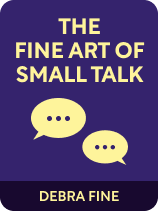

This article is an excerpt from the Shortform book guide to "The Fine Art of Small Talk" by Debra Fine. Shortform has the world's best summaries and analyses of books you should be reading.
Like this article? Sign up for a free trial here .
How can you keep a conversation flowing smoothly? What kinds of questions should you ask to keep a conversation going?
There are two methods you can use to keep a conversation going smoothly: asking open-ended questions about the other person and following up on their answers with additional questions. By avoiding straightforward questions, you give yourself the opportunity to connect more with the other person.
Here are good questions to ask to keep a conversation going.
How to Keep the Conversation Going
Fine states that once you’ve started the conversation, do your part to keep it flowing smoothly. Let’s explore two methods of prolonging conversation: asking open-ended questions that get people talking about themselves and using context clues to follow up on their answers.
How to Ask Open-Ended Questions
According to Fine, a conversation flows best when you create opportunities for your partner to share details you can explore more deeply. Therefore, ask your conversational partner open-ended questions that demand more than a one-word answer. Show interest and encourage them to talk about themselves: The more your partner gives you, Fine says, the more you’ll have to work with later. (Shortform note: You’ll see the value of open-ended questions more clearly in the upcoming section on following up on cues. For now, keep in mind that your goal is always to elicit more than a “yes” or “no.”)
If your question elicits a one-word answer, ask another open-ended question. For example:
- Person A: “How was your vacation?”
- Person B: “Great!”
- Person A: “I’m glad to hear it! Did you do anything particularly exciting?”
- Person B: “Well, my brother and I went water skiing at the lake. We…”
However, Fine includes a caveat to this recommendation: Don’t push topics your partner doesn’t seem willing to engage in. You’re not here to interrogate them: Let them decide how much they’re comfortable saying. If they give a short answer and then steer the conversation elsewhere, Fine recommends you respect that and join them in the direction they’ve chosen.
(Shortform note: This principle is crucial because it prevents you from pressuring your partner to talk about certain things: Your conversation will go most smoothly if you give them space to control the topic. At this point, the conversation has only just started—and you want it to continue—so leave judgment, criticism, and interrogation behind.)
| Give Strangers a Chance to Surprise You The examples of questions to ask to keep a conversation going Fine provides commonly presume some prior knowledge of your conversational partner—for instance, asking a friend how a recent work project went requires prior knowledge of their work plans. When it comes to strangers, however, we often lack the luxury of prior knowledge—so, how can we ask them strong open-ended questions? In such cases, blogger William Rudd suggests asking “what’s your story?” instead of the traditional “what do you do,” or “where are you from?” This question, he explains, gets your partner thinking: It gives them the opportunity to shape their own narrative—to share what’s important to them, what they value, and what they care about. In most cases, that means you’ll hear about more than just the job they don’t enjoy doing or the hometown they no longer identify with. Further, letting others tell you their story prevents you from jumping to conclusions about them. You may assume, for instance, that Jack the car salesman from Kentucky doesn’t have much to offer you, a CEO from Europe. But if you give Jack a chance to tell his own story, you’re much more likely to be intrigued by him and his life. He may tell you about his wife, his children, and the chicken coop they built together last summer. And, just like that, you’ll have a lot more to ask about. |
How to Follow Up on Cues With Additional Questions
Another way to keep conversations going is to follow up with additional open-ended questions. This is where Fine’s recommendation that you show interest in your partner’s answers yields fruit: When you pay attention to their responses, you’ll notice interesting details you can use to deepen the conversation.
You can choose follow-up questions based on any of the following:
1. Anything they’ve mentioned so far—did anything about their previous answers intrigue or interest you? Did they seem particularly proud of anything they brought up? (Shortform note: In particular, dig into the things people mention that are outside of their obligations. For instance, follow up on people’s hobbies, not their job. They’ll enjoy the conversation more if it’s focused on things they want to do than things they have to do.)
2. Things they’re wearing, particularly those which denote group membership. (Shortform note: Why is this such a useful conversational tool? Because a person who wears a Rotary Club pin or a Seattle Seahawks cap to an event is usually doing so for a reason—they’re signaling a personal interest they like to think or talk about. When talking to younger people, keep an eye out for things like cell phone charms, keyrings, pins on their bag or jacket, or stickers on a water bottle.)
3. Their achievements, trophies, and ornaments, especially those they display prominently. (Shortform note: This is particularly useful if you’re addressing someone whose achievements were recently announced (for instance, at a conference), but it’s just as helpful when you’re visiting someone’s home or office. People display what brings them happiness and pride—whether that’s a university diploma or a little figurine of a snail.)
4. The location or occasion. (Shortform note: When all else fails, you can always ask someone what brings them here, who they know and how they met them, or how they’re feeling about the event.)
5. Their behavior, traits, or quirks. (Shortform note: Fine suggests that the way someone speaks or writes can offer you opportunities for small talk—but be careful; it’s easy to offend someone this way. For example, don’t ask someone who seems to speak with a foreign accent “where are you really from?” Maybe they’re from the city you’re in and only picked up the accent from their parents.)

———End of Preview———
Like what you just read? Read the rest of the world's best book summary and analysis of Debra Fine's "The Fine Art of Small Talk" at Shortform .
Here's what you'll find in our full The Fine Art of Small Talk summary :
- Why we need small talk and why we shouldn't avoid it
- How to appear confident and engaging in any context
- How to break the ice with strangers and keep the conversation going







good blog